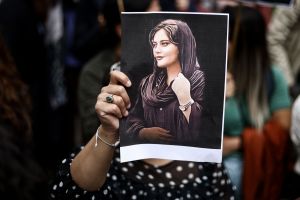The Iranian government is executing 10 people every week on dubious charges such as drug trafficking, blasphemy and “national security concerns”, according to human rights groups.
The toll stands at 209 people executed as of early May in 2023, while the number for the whole of 2022 was put at over 500, putting Iran on course to execute more people this year than it did last.
Videos by VICE
The executions for blasphemy are unusual in Iran even by the standards of the Islamic Republic, where judges have previously passed more lenient sentences for people caught in Iran for similar crimes. A surge in the number of people rushed to execution rooms in Iranian prisons has alarmed human rights groups, who claim Tehran is using executions to spread fear amidst increasing political discontent in the country.
The Iranian judiciary handpicks the reports of executions published on its news agency, Mizan. More reports about death penalties are trickling out, and on Wednesday, the agency reported that authorities have hanged three people accused of being members of the “Panjak gang”, who were accused of being the “biggest cartel distributing cocaine” in the country.
In another report, Mizan said that two men who were convicted in 2021 were hanged in Arak prison on Monday, accused of running a Telegram channel that had posts online dedicated to “atheism and desecration of the sanctities,” according to the Iranian state-run media.
Despite international condemnation, the judiciary in Iran has continued to carry out sentences passed by courts of the Islamic Republic.
Iran is one of the few countries in the world that still practises capital punishment, including for crimes such as drug trafficking, blasphemy, and “spreading corruption on earth” or “enmity against God.” These infamous charges are often used against political figures.
UN Human Rights Chief in Geneva, Volker Türk, called on the Iranian authorities to halt executions in a statement on Tuesday “This is an abominable record, particularly when you consider the growing consensus for the universal abolition of the death penalty,” he said.
“Iran is worryingly on the same track as last year when around 580 people were reportedly executed.” He said that the reports showed the latest wave included a “disproportionately” high number of people representing minorities in Iran.
The Iranian judiciary has been run by the religious authority in the country since 1979, and it is under the direct control of the Supreme Leader Ali Khamenei. The clergymen have used the courts to crack down on any opposition to the regime in Iran and often passed hefty sentences in speedy courts using forced confessions.
Meanwhile, human rights groups monitoring the Iranian judiciary have described the rise in death penalties as a tool used by the government to “spread fear” among the people.
The recent rise in executions follows months of women-led nationwide protests sparked by the death of 22-year-old Mahsa Amini, who died after being arrested by the so-called “morality police” in September 2022 for allegedly wearing an “inappropriate” head covering.
Opposition to the restrictive rules spilt over and led to a protest movement that shook the authority of the religious establishment in the country.
In another controversial case revealed in recent days, Habib Chaab, a 49-year-old political activist from the Ahwazi Arab minority, was executed on Saturday. Chaab was a Swedish-Iranian citizen who was accused of being the leader of a group that it accuses of “killing or wounding 450 people” in Iran, including an attack on a military parade in Ahvaz.
The Swedish Ministry for Foreign Affairs reported that it has summoned Iran’s acting ambassador. “The Ministry conveyed its strong condemnation of the implementation of the death penalty. The death penalty is an inhuman and irreversible punishment, and Sweden, together with the rest of the EU, condemns its use under any circumstances,” it said in a statement.
More
From VICE
-

Blizzard Entertainment artwork featuring characters from their games. -

Gary Gershoff/Getty Images) -

Image Credit: https://www.noradsanta.org/en/map -




